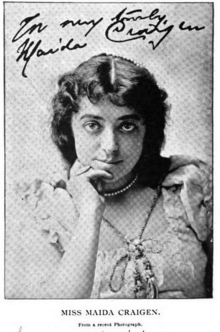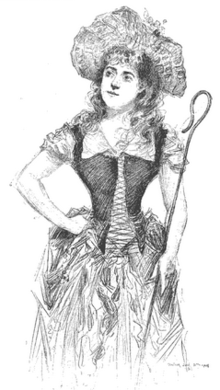Maida Craigen

Maida Craigen (1861 — April 5, 1942) was an American actress and clubwoman.
Early life
Maida Craigen was educated in Boston, Massachusetts. Her mother was a "once noted literary woman".[1]
Career
Stage

Craigen first appeared on stage in 1886, at the Boston Museum,[2] in Dion Boucicault's The Jilt,[3] and in the first production of A. C. Gunter's Prince Karl, which starred Richard Mansfield.[4] In 1889, she was playing Jessica in a New York production of The Merchant of Venice, starring Edwin Booth and Helena Modjeska.[5] In 1891 she appeared in As You Like It in New York, alongside Viola Allen, Maurice Barrymore, and Rose Coghlan, among others.[6]
Willa Cather appreciated Craigen's interpretation of the role of Juliet in 1894, saying "no fault can be found, it is great in that it is like no other actress."[7] Her Juliet was opposite Frederick Paulding as Romeo; she also appeared with Paulding in 1895 in Maine and Georgia, a Civil War drama.[8] She and Paulding were the stars together of the touring repertory troupe, the Maida Craigen Company.[9]
Club work and other activities
In 1891 Craigen was among the organizers of the Twelfth Night Club,[10] a private club for actresses in New York.[11][12] She served on the women's committee of the Actors' Fund Fair in 1892.[13] In 1899 she was vice-president of the Actors' Society of America, and served on the organization's board of directors.[14] She was elected president of the Professional Women's League in 1913,[10] having earlier served as treasurer of that organization under Amelia Bingham and Ida C. Nahm.[15] In 1916, Craigen was head of the drama department of the New York State Federation of Women's Clubs.[16]
A poem by Craigen, "Mystery", appeared in the magazine The Opera Glass in 1894.[17] She was known to enjoy bicycling, saying "Bicycle teachers all say that actors and actresses are the easiest to teach. Is it that our habit of mental flexibility makes us more pliable and poised physically?"[18]
Personal life
Maida Craigen married actor Arthur Falkland Buchanan in 1888, in London.[1] They divorced in 1893.[19] She spent her last years at the Lillian Booth Actors Home, and died at a hospital in Englewood, New Jersey in April 1942, aged 81 years.[20]
References
- 1 2 "Actress Maida Craigen" Boston Globe (March 16, 1893): 4. via Newspapers.com

- ↑ "19th Century Boston Journalism" New England Magazine (March 1907): 47.
- ↑ "Miss Craigen at the Museum" The Opera Glass (July 1894): 86.
- ↑ Paul Wilstach, Richard Mansfield: The Man and the Actor (C. Scribner's 1908): 132.
- ↑ "Broadway Theatre" New York Amusement Gazette (October 28, 1889): 1.
- ↑ "As You Like It" The Illustrated American (July 4, 1891): 295.
- ↑ The World and the Parish: Willa Cather's Articles and Reviews 1893-1902, Volume 1 (University of Nebraska Press 1970): 84. ISBN 9780803215443
- ↑ Untitled news item, The Opera Glass (January 1895): 7.
- ↑ "Plays of the Week" Indianapolis Journal (September 24, 1893): 10. via Hoosier State Chronicles

- 1 2 Lisa Kelly, "The Politics of Tea and Theatre: How Women's Suffrage Groups Used Tea and Theatre to Influence Working and Middle-Class Women to Become Politically Active" (M. F. A. thesis, Virginia Commonwealth University 2009): 48, 56.
- ↑ Benjamin McArthur, Actors and American Culture, 1880-1920 (University of Iowa Press 2000): 75. ISBN 9780877457107
- ↑ Helen Huff, "An (Un)discovered Archive: The Records of the Twelfth Night Club Inc." Broadside (Summer 2011): 8-11.
- ↑ Actors' Fund of America, Souvenir and Programme of the Actors' Fund Fair, Madison Square Garden (J. W. Pratt 1892): 61.
- ↑ Actors' Society Monthly Bulletin (November 1, 1899): 2.
- ↑ "Professional Women's League" The Green Room Book (1909): 673.
- ↑ "Departments" Year Book of the New York State Federation of Women's Clubs (1916): 5.
- ↑ Maida Craigen, "Mystery" Opera Glass (July 1894): 85.
- ↑ "Delsarte and the Wheel" The Opera Glass (November 1894): 166.
- ↑ "Maida Craigen Seeks Divorce" New York Times (June 22, 1893): 8.
- ↑ "The Final Curtain" Billboard (April 18, 1942): 25.
External links
- A publicity photograph of Maida Craigen, in the Billy Rose Theatre Collection Photograph File, New York Public Library Digital Collections.